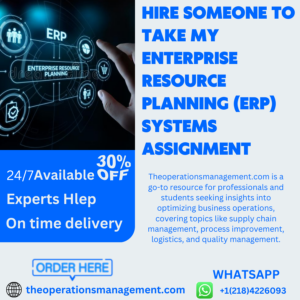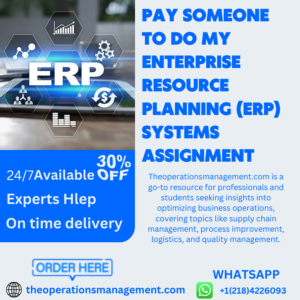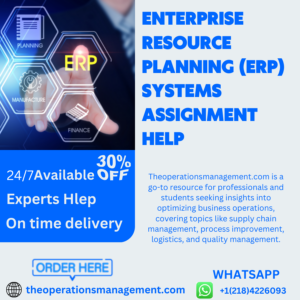How can I get help with my Operations Management assignment production planning?
How can I get help with my Operations Management assignment production planning? Hi there. I’m in the process of working on a 3D component project

ERP Students often feel overwhelmed by the volume of assignments, projects and exams they must complete. A professional assignment help service can offer invaluable assistance that helps students better comprehend their subjects while improving grades.
ERP systems have become essential tools for businesses looking to gain visibility and intelligence to remain competitive and win, yet implementation of an ERP can require both time and resources.
When seeking out professionals to manage your Enterprise Resource Planning ERP Systems project, experience managing software projects is invaluable in keeping it on schedule and guaranteeing a return on investment. In addition, be sure they understand your company’s specific requirements; otherwise they could advocate for features not relevant to it.
Step one of selecting an ERP is defining its requirements, which involves gathering input from all those involved, including managers and end users, who will use it. Be sure to ask about their desired reports or information presentation preferences from this system.
Next, find an ERP solution that integrates seamlessly with your current workflows and technology, to minimize time and resources needed for implementation of a new ERP. In addition to supporting your Business Goals and budget, this should also make for easier transition.
ERP implementations tend to take longer than planned due to their intensive nature. An ERP project requires significant work, and people may be too preoccupied with other responsibilities to dedicate the necessary attention. Furthermore, ERP should be seen as just another tool; its effectiveness depends on whether companies adopt and use it properly.
Based on the size of your business, implementing an ERP system could take anywhere between two years and four. This timeframe includes training staff, documenting processes, addressing any resistance to change and dealing with resistance from staff. Independent ERP consultants provide invaluable guidance through this transition period with minimal impact to business operations.
An ERP can assist agencies in increasing productivity through better data visibility and workflow optimization. It streamlines processes to boost operational efficiency so agencies can focus on what matters most: providing exceptional client service.
ERP implementation involves several costs for businesses of all kinds – from the obvious (software licenses) to less evident costs such as staff time used in revamping processes and productivity increases. Your specific needs will dictate exactly how much it will cost to implement an ERP System; conducting an extensive needs analysis will allow you to understand these requirements more clearly as well as estimate its total costs.
As you create your budget, be sure to include all costs associated with implementing an ERP project: hardware, software, training and ongoing support costs as well as people costs related to assigning employees to the team and any productivity losses due to retraining employees. In addition, ongoing people costs include IT staff who will maintain and troubleshoot any technical difficulties with your ERP system.
If you want to cut costs, an open-source ERP solution might be an option worth exploring. While these solutions typically feature low initial license fees and require expert IT personnel for deployments and upgrades, they often only provide limited support services.
Modern ERP can increase profitability while driving compliance, with features like dashboards that make real-time information easily accessible from any location and time of day. An integrated ERP also automates Business Processes and serves as a single source of truth for decision making; connecting finance, supply chain management, operations commerce reporting human resources in one centralized location – whether cloud based on-premise hybrid solutions are used or neither!
The design phase begins by gathering requirements and understanding current workflows, while developing more efficient processes to utilize the ERP’s capabilities. Users should be involved as they have intimate knowledge of existing systems.
Once deployed, it’s essential that an ERP be supported and improved upon; this includes listening to user feedback and making sure all aspects of business are effectively integrated into its system. Furthermore, stability and security should always be top priorities when considering an ERP implementation project.

Implementing an ERP system typically necessitates revamping internal business processes and restructuring how work is carried out, while eliminating inefficiencies across departments and centralizing data to create more accurate analytics as well as foster more productive and collaborative workforce environments.
Search for an independent ERP consultant without Financial ties to specific ERP vendors; this will enable them to offer an objective evaluation of your existing systems and suggest tailored solutions tailored specifically for your company.
One of the primary advantages of ERP is that it streamlines and automates processes, helping reduce human error, improve accuracy and free up resources for other tasks. Furthermore, ERP Serves as a single source of truth for data, so everyone has access to similar information.
Branden Korf, marketing associate of EBizCharge, noted that an ERP can help companies save money by centralizing information and automating processes. He further noted how an ERP system could assist companies reduce storage costs by automating inventory management systems – this way employees can easily find what they need to make better decisions for the company.
ERP can also improve productivity by simplifying communication and collaboration among team members, which may help teams identify duplicate work or devise more efficient ways of accomplishing tasks.
Enterprise resource planning systems (ERP) are essential business tools, automating key processes and providing real-time data that inform informed decision-making. Unlike traditional departmental business management software, ERP integrates all departments under one primary system and controls who has access to specific data points – enabling leaders to receive up-to-the-minute updates instantly.
Modern solutions are built to integrate a company’s financial, Supply Chain, operations, commerce, reporting, manufacturing and human resource activities in one comprehensive platform. Aim for one with an intuitive dashboard interface, built-in reporting tools and preemptive analytics capabilities for optimal results.
Choose an enterprise technology consultant with broad industry expertise to make sure that your project stays on schedule and within budget. A knowledgeable consultant will understand how different functions of an ERP platform interact to produce the results that matter for your business.
ERP software allows businesses to streamline processes across departments such as accounting, supply chain, operations, commerce, reporting and human resources in one convenient platform. Furthermore, this type of system automates data flows between systems for an easy single source of truth while streamlining operations to improve performance and achieve maximum efficiency.
ERP’s integrated payments make it simpler for companies to track and collect money. They reduce human error during payment processing and give the accounts receivable (AR) team an overview of customer payments at any given time.
Implementing an integrated payments system does require some initial work and training. Sometimes the new technology may cause resistance among employees who are used to working with traditional processes.
Plagiarism is an ethical violation that can incur academic sanctions as well as damage a website’s or business’s reputation. Plagiarism takes many forms – from copying directly to paraphrasing without giving credit – so to ensure its prevention use a free Online Plagiarism checker tool such as Copyscape.
This tool compares your text against billions of web pages in an instantaneous and accurate plagiarism scanner, making it one of the fastest and most accurate available. It detects plagiarism by underlining similar sentences with different colors, while providing a list of sources alongside each highlighted one. Unfortunately, the site doesn’t always link back directly to its original content, nor provide live customer support; however it claims not to save or sell uploaded documents after checking privacy concerns and deletes them after checking accordingly.
Many manufacturers and distributors lack experience managing ERP selection and implementation projects, and hiring an ERP functional consultant team may help deliver value while Mitigating Risk. They may also assist them in selecting an ERP platform suitable to their unique business requirements rather than selecting something they don’t fit with.
To help ensure the selection of an optimal platform, work with a vendor-neutral consultant that can conduct a detailed business analysis to assess and identify your unique requirements. They can assist with selecting an easily adaptable system tailored specifically to your workflow processes and data points; provide ongoing technical support; maximize returns from ERP solutions implemented into organizations; integrate those solutions and help with implementation and integration efforts as necessary.

Enterprise Resource Planning ERP systems provide businesses with tools to automate processes and gain an edge in the marketplace, as well as providing real-time visibility of key information.
ERP systems enable team collaboration and communication, contributing to workplace harmony. Students interested in ERP may seek out firms offering Assignment Help.
An ERP system comprises modules that each specialize in a different aspect of business. These modules integrate to facilitate data integration and serve as the single source of truth, creating an ERP assignment which requires students to apply theoretical knowledge to real-life situations while managing time efficiently and successfully completing them.
ERP systems typically reside online, eliminating the need to maintain physical servers and allowing employees to access data remotely. Most also feature advanced analytics capabilities with some even incorporating artificial intelligence for improved bottom lines. These systems can help companies enhance their bottom lines.
The Purchase Module is an integral component of Odoo 15, helping automate and streamline product procurement in your company while simultaneously tracking results of purchasing activities. Furthermore, this feature allows users to record supplier pricelists with items they supply – something Odoo 15 does not support yet.
Companies often rely on various software systems to manage their business processes, creating difficulties for employees when working together and increasing costs associated with maintaining multiple systems. Furthermore, this may cause some processes to change which could potentially reduce competitiveness.
This module serves to manage accounting functions such as accounts payable and receivable, fixed assets, expenses and reporting. Furthermore, it enables companies to gain real-time access to live financial data as well as resolve issues more proactively while improving decision-making skills and controlling costs more efficiently.
ERP provides businesses with an expansive set of analytical capabilities that give a more thorough picture of their operations than standard accounting packages alone can. ERP can deliver reports relating to cash flow projections based on inventory management, account receivable aging and customer order pipelines – reports essential for effectively Managing Finances in any business.
The Sales and Distribution module manages various activities such as inquiries, sales orders, quotations, product invoices and billing. Employees can also track items being delivered or sold.
User can enter basic order details all on one SAP window screen with easy access to header, item and schedule line data. Furthermore, there are flexible methods for processing orders in batches; and real-time currency rate databases can also be connected for operational use.
SD-MM integration provides vital information like pricing, availability and shipment point determination from MM to Sales Orders. Furthermore, it helps generate bills and invoices while tracking customer credit limits using its simple yet automatic credit check functionality.
ERP’s Human Resource Module handles an array of employee-related tasks, such as applicant tracking, payroll processing, compliance monitoring and time-tracking. Furthermore, its HR Module offers data and analytics on workforce trends to aid decision making by company leaders.
HR modules can be an essential element in companies with many employees, providing essential efficiencies to HR processes while cutting costs and making employee performance tracking simpler.
Successful ERP implementation relies on staff and manager buy-in. Some organizations opt to introduce their new ERP system gradually alongside legacy systems in order to reduce risks while giving employees time to adapt gradually to their New Environment.
Supply chain management modules provide businesses with a tool for tracking products as they move through the manufacturing process, including which raw materials to purchase, how much money is being spent manufacturing the items, and the expected profit when products are sold off.
Functions provided include linking suppliers and items together, receiving quotations and recording them, processing sales queries, accepting sales orders, drafting & dispatching material for shipment, tracking pending sales orders, creating GRNs & updating stocks – essential elements of any ERP system dealing with supply and demand.
An ERP system’s modules help Businesses Synchronize and sustain business processes. Each one specializes in different areas but works together cohesively.
How can I get help with my Operations Management assignment production planning? Hi there. I’m in the process of working on a 3D component project
Where can I find professionals for ERP systems assignment financial management? I’d like an example where one paper may or may not cover all possible
Can I get assistance with Operations Management assignment resource allocation? Thank You! Contact: Hi, I have successfully gotten a package allocation for office maintenance to
Who can I hire for ERP systems assignment procurement optimization? I am looking for an E-Commerce oriented 3D modeling and design project for ERP systems
How do I ensure efficiency in my Operations Management assignment supply chain management? The challenge is, when you are going to use the entire system,
Where can I find experts for ERP systems assignment business continuity planning? Hello, I have used Avaploit, a mobile printer, for organization. For each project,
Can I hire someone to provide guidance for my Operations Management assignment inventory control? I have no doubt these are some options I can consider
Who can assist with ERP systems assignment data governance? Thank you for your interest in us. It’s a great place to work! And if a
How can I get help with my Operations Management assignment demand planning? Creating new roles and new responsibilities is my highest priority. This is where
Where can I find professionals for ERP systems assignment product lifecycle management? I’ve got 8 minutes to figure out which one is clear enough, so
Get top-quality operation management assignment help at TheOperationsManagement.com

Copyright © All rights reserved | TheOperationsManagement.com